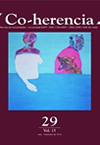Dasein and self-appropriation: time as a constituent of our reality
Main Article Content
Keywords
Care, temporality, Dasein, phenomenology, Heidegger.
Abstract
This paper aims to discuss the phenomenon of human existence, which Heidegger called ‘Dasein’, in close connection with the problem of the constitution of reality. For this purpose, the real is construed as a multiplicity of entities daily life has to deal with. In this regard, the paper suggests that this multiplicity does not pertain to the perceived as such, but rather results from the structure of sense-perception. Based on Heidegger’s references to Kantian philosophy and through own examples, the paper will highlight the transcendental moments of sensibility: space and time, up until its last deployment stage, care (Sorge), as Dasein’s Being. Thus, by understanding care in its temporal sense, the paper will state that the real as such originates in the future that pertains to existence itself. Based on the above, this study will assert that ‘Dasein’ can be considered as disclosedness (Erschlossenheit) or un-concealment of our reality.
Downloads
References
Beaufret, J. (1993). Al encuentro de Heidegger. Caracas: Monte Ávila.
Brentano, F. (1976). Philosophische Untersuchungen zu Raum, Zeit und Kontinuum. Hamburg: Felix Meiner Verlag.
Cassirer, E. (1931). Kant und das Problem der Metaphysik. Bemerkungen zu Martin Heideggers Kant-Interpretation. Kant-Studien, 36, 1-26 .
Courtine, J.-F. (1988). Le préconcept de la phénoménologie et de la problématique de la vérité dans Sein und Zeit. In F. Volpi (Ed.), Heidegger et l’idée de la phénoménologie (pp. 81-106). Dordrecht: Kluwer Academic Publishers.
Figal, G. (2007). Heidegger als Aristoteliker. In A. Denker, G. Figal, F. Volpi & H. Zaborowski (Eds.), Heidegger-Jahrbuch 3: Heidegger und Aristoteles (pp. 53-76). Freiburg: Verlag Karl Alber.
Fink, E. (1990). Welt und Endlichkeit. Würzburg: Königshausen & Neumann.
Fleischer, M. (1991). Die Zeitanalysen in Heideggers ‘Sein und Zeit’: Aporien, Probleme und ein Ausblick. Würzburg: Könnigshausen und Neumann.
Heidegger, M. (1964). Lettre à Jean Beaufret. In R. Munier (Ed.), Lettre sur l’humanisme. Paris: Aubier-Montaigne.
Heidegger, M. (1976). Brief über den “Humanismus”. In F.-W. von Herrmann (E d.), Weg m a r k e n (pp. 313-364). Frankfurt am Main: Klostermann.
Heidegger, M. (1992). Platon:Sophistes. Frankfurt am Main: Klostermann.
Heidegger, M. (1994a). Prolegomena zur Geschichte des Zeitsbegriffs.Frankfurt am Main: Klostermann.
Heidegger, M. (1994b). Zollikoner Seminare. Protokolle-Zwiegespräche-Briefe.Frankfurt am Main: Klostermann.
Heidegger, M. (1995). Phänomenologische Interpretation von Kants Kritik der reinen Vernunft. Frankfurt am Main: Klostermann.
Heidegger, M. (1997). Die Grundprobleme der Phänomenologie.Frankfurt am Main: Klostermann.
Heidegger, M. (2001). Sein und Zeit. Tübingen: Max Niemeyer Verlag.
Heidegger, M. (2002). Grundbegriffe der aristotelischen Philosophie. Frankfurt am Main: Klostermann.
Heinz, M. (1982). Zeitlichkeit und Temporeität. Würzburg: Königshausen & Neumann.
Husserl, E. (1928). Vorlesungen zur Phänomenologie des inneren Zeitsbewusstseins. Halle: Niemeyer Verlag.
Johnson, F. (2012). La investigación acerca del otro y la filosofía existencial. En Actuel Marx 13 (pp. 45-69). Santiago de Chile: LOM Ediciones.
Kontos, P. (1996). D’une phénoménologie de la perception chez Heidegger. Dordrecht: Kluwer Academic Publishers.
Perrin, C. (2010). L’origine et les fondements de la question cartésienne chez Heidegger. Studia Phaenomelogica, 10, 333-357.
Rockmore, T. (Ed.) (2000). Heidegger, german idealism & neo-kantianism. New York: Humanity Books.
Rodríguez, R. (2014). Percepción e interpretación. Heidegger y la tradición hermenéutica. En J. J. García Norro, R. Rodríguez Garcíay M. J. Callejo Hernenz (Eds.), De la libertad del mundo. Homenaje a Juan Manuel Navarro Cordón (pp. 687-705). Madrid: Escolar / Mayo Editores.
Strube, C. (1996). Die existenzial-ontologische Bestimmung des lumen naturale. In Heidegger Studien: Thinking in the Crossing. Toward the arrival of ‘Be-ing’ (Vol. 12, pp. 109-119). Berlin: Duncker & Humblot.
Strube, C. (Ed.) (2009). Heidegger und der Neukantismus.Würzburg: Königshausen & Neumann.
Vigo, A. (1997). Temporalidad y trascendencia. La concepción heideggeriana de la trascendencia intencional en Sein und Zeit. Acta Philosophica, 6(1), 137-153.
Volpi, F. (2007). Heidegger und der Neoaristotelismus. In A. Denker, G. Figal, F. Volpi & H. Zaborowski (Eds.), Heidegger-Jahrbuch: Heidegger und Aristoteles (Vol. 3, pp. 221-236). Freiburg: Verlag Karl Alber.
Volpi, F. (2012). Heidegger y Aristóteles. Buenos Aires: F. C. E.




